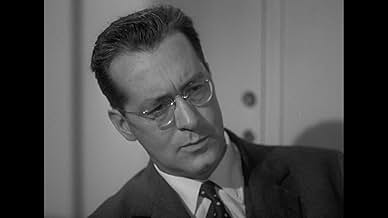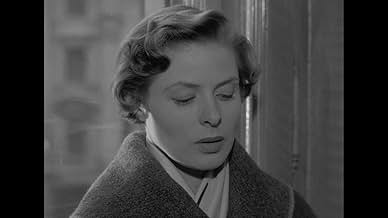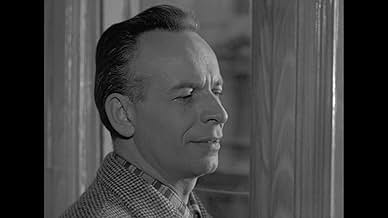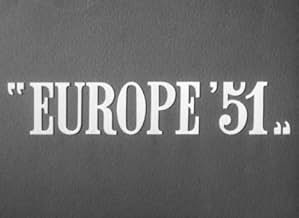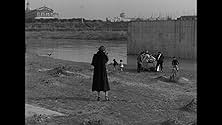IMDb RATING
7.4/10
5.2K
YOUR RATING
A wealthy woman becomes obsessed with humanitarianism when her young son dies after committing suicide.A wealthy woman becomes obsessed with humanitarianism when her young son dies after committing suicide.A wealthy woman becomes obsessed with humanitarianism when her young son dies after committing suicide.
- Awards
- 4 wins & 1 nomination total
Carlo Hintermann
- Extra
- (uncredited)
Antonio Pietrangeli
- Psichiatra
- (uncredited)
Rossana Rory
- Infermiera della casa di cura
- (uncredited)
Featured reviews
"Europa 51" may be the best of all the Bergman/Rosselini collaborations of the fifties,outshining such works as "Viaggio in Italia" or "Stromboli,terra de dio". There are two worlds in this god almighty universe:the one in which time is only a quiet river,and the one in which time is killing you.Irène (Bergman)belongs to the former one.Masina's character and Inès,the prostitute to the wrong side of town. When her son committed suicide,Irène was chatting,exchanging trivialities with her posh guests.Eaten with remorse,she realizes her taste for society life took the best of her and now it's too late!
One of her friends opens the gates of a then-unknown world for her:factories where men sweat ,streets where whores roam,slums where mothers strive to feed thir starving children.The man is a Marxist,and he tells Irene about a brand new world where justice and solidarity will be the golden rule.
However,Irene cannot subscribe to this ideology:"This world is not mine because it does not include Michel"-her late son".Beyond that point,the movie turns Christian;Marxist materialism cannot satisfy a desperate woman whose spiritual longing is intense.So she takes altruism to new limits,forgetting all about herself,becoming some kind of Mother Theresa.Christian,too Christian...Her family begins to think she 's lost her mind,and they locked her up in an insane asylum.
Is the ending optimistic or pessimistic?I would opt for the first epithet:behind her bars,Irène can see her new friends come and worship her as a saint.She's lost her wealth,but Michel's death was the beginning of an end for her.Through this redemption,she knows that now,this unfortunate boy forgave her
This is one of Bergman's unfairly forgotten performances.It is accessible and should appeal to a very large public.
One of her friends opens the gates of a then-unknown world for her:factories where men sweat ,streets where whores roam,slums where mothers strive to feed thir starving children.The man is a Marxist,and he tells Irene about a brand new world where justice and solidarity will be the golden rule.
However,Irene cannot subscribe to this ideology:"This world is not mine because it does not include Michel"-her late son".Beyond that point,the movie turns Christian;Marxist materialism cannot satisfy a desperate woman whose spiritual longing is intense.So she takes altruism to new limits,forgetting all about herself,becoming some kind of Mother Theresa.Christian,too Christian...Her family begins to think she 's lost her mind,and they locked her up in an insane asylum.
Is the ending optimistic or pessimistic?I would opt for the first epithet:behind her bars,Irène can see her new friends come and worship her as a saint.She's lost her wealth,but Michel's death was the beginning of an end for her.Through this redemption,she knows that now,this unfortunate boy forgave her
This is one of Bergman's unfairly forgotten performances.It is accessible and should appeal to a very large public.
Europa 51 has a big heart, this much is clear. It's a story where Rossellini and his collaborators want to pose a basic question: what does someone have to do, like literally do with their own hands and wills and TIME, actually taking time and energy out of their days, to make a difference for people? The question may be surrounded by an, arguably, heavy-handed set-up, where Ingrid Bergman plays an ambassador's wife in Italy, and their son, a bit of a spoiled mama's boy (or, no, maybe he's just the sensitive sort, you pick, but either way not dubbed particularly well), dies accidentally. Bergman's Irene can't stand herself for what has happened - all her time being a dilettante and not spending enough time with her son made this happen - and she can barely go on.
Someone, a friend who has Communist ties, tries to convince her that perhaps it's time to make a change amid this time of Societal Upheaval (in caps) as political sides are being more sharply drawn. She sees how people suffer, and a day at a factory basically makes her completely light-headed (a montage of images, if memory serves, makes this clear). She wants to help. Maybe if she puts her energies to positive use, to help others, she can... what, find some solace? Alleviate her guilt? Or that now she can't be a mother to her son - and there's not much effort between her and her husband to find love again - so why not be a Mother to others? It's a little more difficult than that, of course, which is the riding factor of conflict in the narrative.
Bergman plays this character with all of the beats just right. Early on in those first scenes with her and her son you might wonder whether the writing isn't totally clear - IS she being a bad mother, or is he just whining, or is it a little 'much' determining either, who knows - but she plays it just right, this woman in her life who has it all and doesn't have to worry about much. This includes hearing conversations about class struggles (this before she sees them first hand) and can barely comprehend it. How Bergman channels grief is even better, showing us a face that has the life totally drained out, and she is always *listening* as an actress too to what's around her, and is a strong listener which is key. Ironic then that many of these, almost all of them, are speaking Italian and are dubbed over - this includes Giuletta Masina, who plays a local housewife.
Not all of the writing is superb here, at least for me. It's surprisingly melodramatic in its last quarter as Irene is looked at as being completely crazy (possibly, borderline, criminal) in how she's helping these people, which includes keeping one man evading prosecution in her home. I have to wonder if this story could work today, though a filmmaker like Scorsese, one of Rossellini's disciples, sort of made his version with Bringing Out the Dead - a protagonist who is haunted by death and wants to make a difference. It is a very hard thing to be saintly, or just be a decent person when there are many, many indecent things and people that go about in this world, certainly in this context post-war, post-fascist-cum-Communist Italy.
There's a lot to digest here, even if some of it may come off as dated or simplistic. But, once again as with Stromboli, the combination of a director with a clear, very moral message, and an actress giving it her ALL (and it's a case where Bergman does give one of her best performances from this period, even if the film isn't), that you can watch it and be wrapped up in this woman's drama.
Someone, a friend who has Communist ties, tries to convince her that perhaps it's time to make a change amid this time of Societal Upheaval (in caps) as political sides are being more sharply drawn. She sees how people suffer, and a day at a factory basically makes her completely light-headed (a montage of images, if memory serves, makes this clear). She wants to help. Maybe if she puts her energies to positive use, to help others, she can... what, find some solace? Alleviate her guilt? Or that now she can't be a mother to her son - and there's not much effort between her and her husband to find love again - so why not be a Mother to others? It's a little more difficult than that, of course, which is the riding factor of conflict in the narrative.
Bergman plays this character with all of the beats just right. Early on in those first scenes with her and her son you might wonder whether the writing isn't totally clear - IS she being a bad mother, or is he just whining, or is it a little 'much' determining either, who knows - but she plays it just right, this woman in her life who has it all and doesn't have to worry about much. This includes hearing conversations about class struggles (this before she sees them first hand) and can barely comprehend it. How Bergman channels grief is even better, showing us a face that has the life totally drained out, and she is always *listening* as an actress too to what's around her, and is a strong listener which is key. Ironic then that many of these, almost all of them, are speaking Italian and are dubbed over - this includes Giuletta Masina, who plays a local housewife.
Not all of the writing is superb here, at least for me. It's surprisingly melodramatic in its last quarter as Irene is looked at as being completely crazy (possibly, borderline, criminal) in how she's helping these people, which includes keeping one man evading prosecution in her home. I have to wonder if this story could work today, though a filmmaker like Scorsese, one of Rossellini's disciples, sort of made his version with Bringing Out the Dead - a protagonist who is haunted by death and wants to make a difference. It is a very hard thing to be saintly, or just be a decent person when there are many, many indecent things and people that go about in this world, certainly in this context post-war, post-fascist-cum-Communist Italy.
There's a lot to digest here, even if some of it may come off as dated or simplistic. But, once again as with Stromboli, the combination of a director with a clear, very moral message, and an actress giving it her ALL (and it's a case where Bergman does give one of her best performances from this period, even if the film isn't), that you can watch it and be wrapped up in this woman's drama.
10EdgarST
After filming stories about the resistance of the Italian people during the Fascist and Nazi regimes, and the story of a German child against the barren landscape of Berlin after the war, Roberto Rossellini made a movie about Francis of Assisi and started a love and work relationship with actress Ingrid Bergman. In his evolution to works like 'The Rise To Power of Louis XIV', he made a series of melodramas with Bergman, of which 'Stromboli' and 'Voyage To Italy' are always considered the most important. Add to that list this fine drama, in which bourgeois housewife Irene suffers a transformation when confronted with the misery of those who had not been benefited with the European 'economic miracle.' Considered a saint by those she helped (Giulietta Masina included), Rossellini makes quite obvious that Irene reached that state by detouring from the usual roads she took as the wife of a prominent industrialist (Alexander Knox.) Not only has she a Marxist cousin who curiously does not preach his philosophy, but gives Irene advise whenever she talks about the misery she is discovering- but she also ventures into the slums, helps a single mother, a prostitute and a thief. The final section of the movie reminded me of 'María de mi corazón', a latter film written by Gabriel García Márquez, based on a real story. As in 'María
' there is neither opportunity nor chance to explain clearly what she's going through to husband or authorities, leading her to a dead end of desperation. Only sainthood will save her from the dehumanization around her.
Do you remember when film featured up close photography, colorless images allowing character interaction to be the foreground, and spoken dialogs with noticeable pauses? Do you remember the last time a film haunted you? Correct
it simply flashed to mind without your invitation! If you can touch any of these viewing memories, this film may be worthy of 108 minutes.
Europe '51 is directed by Roberto Rossellini, and stars the stunning master of nuanced emotion, Ingrid Bergman. The 1952 film is set in Rome, post WWII, and features wonderful set designs to distinguish the comfortable life and the dire struggles known to the rest of us.
As Irene, Bergman undergoes a metamorphosis that will beckon the dark experience of an unexpected loss of a beloved, and the consequential deep fall into emptiness. Irene is first introduced to us as the consummate hostess with a natural grace and instinctive flair for entertaining. She ignores the voice of her only son repeatedly to fulfill her social obligations. Bonded by their time of closeness under the threat of air raids, Irene is no longer burdened to protect and comfort her son in the present post-war calm.
Her 10 year old son, Michele, takes his life after repeated, failed attempts to gain his mother's affection and attention. Irene is paralyzed by the loss, and her husband, George, accommodates her every wish until he comes to think she is having a love affair. The grieving mother finds solace in service to those in need, and her family is bewildered. Her long absences from home, loss of interest in social engagements, and avoidance of her husband leave her family troubled.
Irene is transitioning spiritually as a means to heal her loss. She is introduced to a family in need of assistance, and she finds great joy in acts of compassion. Irene assists this family to secure treatment for their sickly son, she then befriends a single mother of six dependents, and tirelessly administers care to a young, isolated prostitute whose life is yielding quickly to tuberculosis. Irene's deeds are in conflict with her social position, and neither her husband nor her mother can compel her return to them. Irene has become a passionate, driven arm of charity in service to her community. She can not return to the life she knew prior to the loss of her young, beloved son. Her family can not understand the sweeping changes Irene has internalized. They confine her to a mental institution. She accepts this placement, and silently radiates a saintly mercy as she encounters the helplessness of the other patients.
Fortunately, Rossellini allows you to script your own ending as you look upon Irene from behind the confinement of cell bars at the mental institution. She has been visited by her family, and the family of the sickly boy she assisted. After your viewing, it would be good to hear from you.
Europe '51 is directed by Roberto Rossellini, and stars the stunning master of nuanced emotion, Ingrid Bergman. The 1952 film is set in Rome, post WWII, and features wonderful set designs to distinguish the comfortable life and the dire struggles known to the rest of us.
As Irene, Bergman undergoes a metamorphosis that will beckon the dark experience of an unexpected loss of a beloved, and the consequential deep fall into emptiness. Irene is first introduced to us as the consummate hostess with a natural grace and instinctive flair for entertaining. She ignores the voice of her only son repeatedly to fulfill her social obligations. Bonded by their time of closeness under the threat of air raids, Irene is no longer burdened to protect and comfort her son in the present post-war calm.
Her 10 year old son, Michele, takes his life after repeated, failed attempts to gain his mother's affection and attention. Irene is paralyzed by the loss, and her husband, George, accommodates her every wish until he comes to think she is having a love affair. The grieving mother finds solace in service to those in need, and her family is bewildered. Her long absences from home, loss of interest in social engagements, and avoidance of her husband leave her family troubled.
Irene is transitioning spiritually as a means to heal her loss. She is introduced to a family in need of assistance, and she finds great joy in acts of compassion. Irene assists this family to secure treatment for their sickly son, she then befriends a single mother of six dependents, and tirelessly administers care to a young, isolated prostitute whose life is yielding quickly to tuberculosis. Irene's deeds are in conflict with her social position, and neither her husband nor her mother can compel her return to them. Irene has become a passionate, driven arm of charity in service to her community. She can not return to the life she knew prior to the loss of her young, beloved son. Her family can not understand the sweeping changes Irene has internalized. They confine her to a mental institution. She accepts this placement, and silently radiates a saintly mercy as she encounters the helplessness of the other patients.
Fortunately, Rossellini allows you to script your own ending as you look upon Irene from behind the confinement of cell bars at the mental institution. She has been visited by her family, and the family of the sickly boy she assisted. After your viewing, it would be good to hear from you.
I suppose that when "Europa '51" was going to be filmed there was a great professional mutual understanding between Rossellini (the director) and Ingrid Bergman (main actress). It's really astonishing the way Ingrid Bergman's face changes throughout the movie. She really looks like a "human God" (specially towards the end) just by looking at her expressions. If you have the opportunity of watching "Europa '51" twice, you will notice that her character in the beginning of the story, where Irene Girard (Ingrid Bergman) is the mother of a well-off family, is totally different from the last shots. I also like how Irene contrasts with the way of living of the poor children and working-women. Although Rossellini's movie is a bit lengthy, bearing in mind it was made in Italy in 1952, many events occur with short scenes perfectly connected obtaining a gorgeous dynamism as a whole. I'm almost sure that my favorite scene is the same as the majority of the people who watched "Europa '51". I refer to the moving ending of the story. I also like how the camera moves around capturing the contrast of expressions between the sick patients and Irene. I encourage everybody to watch this masterpiece, even twice!
Did you know
- TriviaThe square Irene and Andrea drive to is the Campidoglio in Rome. The equestrian statue is of Marcus Aurelius, emperor and stoic philosopher.
- GoofsWhen Michele falls down the stairs, his parents rush to the car to get him to the hospital. When his mother finds him, she is wearing the white gown she wore at the dinner. When they first arrive at the hospital, she has a fur coat on. A few hours later, suddenly she has changed into a grey suit.
- Quotes
Irene Girard: It is just that the love we feel for those closest to us, for those who should be and maybe really are dearest to us, suddenly isn't enough. It seems too selfish, too narrow. So, that we feel the need to share it, to make our love bigger until it embraces everyone.
- Alternate versionsIngrid Bergman, Alexander Knox and the other English-speaking actors dub their own voices into English for the English version.
- ConnectionsEdited into L'ombre qui pensait plus vite que son homme (1991)
- SoundtracksBésame Mucho
Written by Consuelo Velázquez
- How long is Europe '51?Powered by Alexa
Details
Box office
- Gross worldwide
- $9,381
- Runtime
- 1h 58m(118 min)
- Color
- Aspect ratio
- 1.37 : 1
Contribute to this page
Suggest an edit or add missing content

